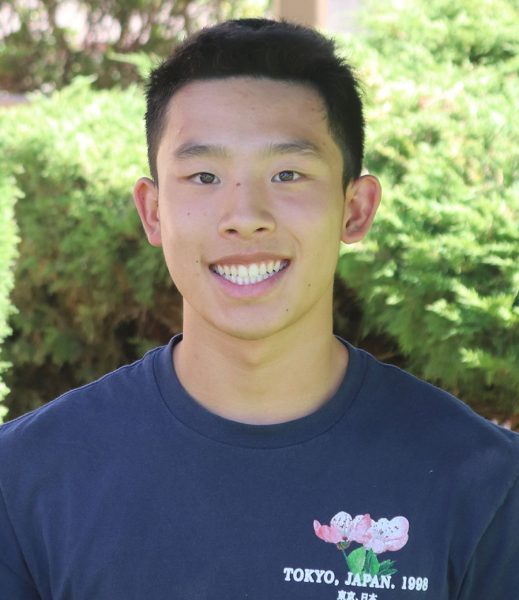Set, hike! This is your first football game in a high school setting. As you hear those words, you sprint down the field, following the route that your quarterback gave you. You try to stay calm, but the nerves inside your body start to take over and the thought of letting your team down forever haunts you. The quarterback throws the ball and it heads straight in your direction. Your heart begins to beat faster and your hands start to shake. The ball slips past your fingertips and hits the ground. Many freshman on varsity teams in high school fear this situation, worrying about the blame they might receive from teammates.
When someone moves into high school, the environment changes entirely. As an eighth-grader in middle school, the workload is relatively light, the campus feels familiar and inviting, and the community is welcoming. But in high school, everything from the campus to the people is unfamiliar. The same thing can be said for sports, but this pressure is brought to a whole new level by the select few freshmen athletes who make it into varsity. Spectators who see a younger athlete play generally only think about how talented they are, but most people don’t think about the pressure that a freshman varsity athlete may bear. People don’t think about the lack of confidence that may come from feeling out of place when adjusting to the level of competition. Sophomore swimmer Dylan Fujita was a freshman varsity athlete last year and he talks about his thoughts coming into the high school season as a Freshman.
“I wasn’t sure what to expect from high school sports and I was initially scared that the pressures from it may be more than what I’m used to,” Fujita said.
High school sports teams definitely have higher expectations. Varsity sports typically have longer practices with more intense training than JV, something most ninth graders are new to. For example, Varsity swimmers have three morning practices a week and generally have to swim an hour longer per day in the afternoon than their Junior Varsity counterparts. Additionally, after morning practice, student-athletes have to go to school and have practice after school. Freshman athletes playing on the varsity level are expected to adapt to the higher competition, hours of practice, and commitment to the sport all while getting used to the new high school community. Sophomore volleyball player Maura Hambly talks about her experience with the shift from middle school to high school and how she dealt with it.
“There was definitely a pressure shift going from eighth grade to ninth grade because you are playing with older girls, stakes are higher, and in general there are just more people watching you,” Hambly said. “I was able to deal with this with my teammates and coaches because they have been nothing but supportive and encouraging.”
Being likely one of the only freshmen on the varsity team, these young athletes may be inclined to feel inferior to their older and more experienced teammates. As a result, they may feel unfit for the team and less motivated to push themselves to be better. According to a PsychCentral article written by Dr. Bethany Judy, “Loneliness and social isolation [are] the main causes for mental health issues,” (Judy 2021).
Bad mental health or an overall negative mindset can limit an athlete’s ability to train or play. When an athlete experiences stress, anxiety, or depression, it can be hard to stay focused and persevere through these tough feelings, especially going through such a hormonal transition through high school. A negative mindset can make athletes very self-critical, adding to the inferiority complex that many younger athletes feel in comparison to the older “star” athletes. Current junior Grace Henderson, who played water polo on varsity, recounts how she felt as one of the youngest athletes on the team during her freshman year.
“I honestly didn’t have the best confidence going into the season,” Henderson said. “I experienced hate for being a freshman on varsity and remember it being pretty hard to fit in with the rest of the girls since most of them were upperclassmen.”
She mentions that she was eventually able to fit into the varsity community with the support of her coach and some more inclusive teammates.
“Although I felt isolated at first, there were still plenty of positive experiences with the team, and my coach guided me through the whole thing,” Henderson said. “After a slow start, I eventually started to adapt to their community and began to feel like I belonged.”
In contradiction with Henderson’s experience, current sophomore Justin Fung who played as a freshman on varsity for football and baseball thought adapting to the community was fairly easy.
“I knew a lot of the older kids from childhood and that helped me a lot to adjust because they believed in me,” Fung said. “I didn’t have to get to know a completely different group of kids, and I could just be confident with my skills and abilities”.
Going from competing against kids of similar ages in middle school to competing against teenagers older and bigger on the varsity level is the most common struggle freshmen face.
“I don’t think the shift from middle to high school was a huge jump because by having an older brother and a dad that works at the high school, I was already around that culture for a long time and throughout my childhood and I played a lot of the time with older kids which I think helped the shift a lot,” Fung said.
Another example of a freshman athlete who is able to thrive in a varsity environment is current sophomore swimmer Dylan Fujita.
“Last year I did varsity swimming,” Fujita said. “I was able to fit in with the swim team because I already knew most of the swimmers on the team from swimming in my club at Alto swim club.”
Because of the support from his teammates, he was able to do very well that season.
“Since I was close friends with most of the swim team, I feel like I was able to do really well,” Fujita said. “I went many best times, dropping a lot [of time] in both my 200-yard freestyle and 500-yard freestyle, as well as making a few strides in other events. My coach, Danny Dye, has told me he has high expectations for my performance in the future.”
Building team chemistry is also a huge factor in leading any team to success. With a freshman on a team filled with upperclassmen, it may be hard to bond because although the whole team is in high school, they are in different stages and experiencing different things. Another thing that freshmen varsity athletes have to deal with is the constant high expectations from other teammates as well as coaches. Being forced into high expectations can cause negative reactions. According to a Medium article written by Fernando Nunes, “[a]nxiety and high expectations can lead us to unnecessary pressures, fear of failure, tense relationships, and severe self-criticism,” (Nunes 2024). All of these reactions can lead to a negative mindset towards a sport and may cause an athlete to lose motivation, play worse, or not want to play anymore.
“I experienced a moment in club swimming where I had to perform under high pressure and I ended up overthinking it and not doing well,” Fujita said.
Losing motivation or losing love for the sport is hard to overcome. Especially with the stakes being high, pressure can come to be seen. Regardless of this, given the support most freshman varsity athletes receive while playing from coaches, teammates, and even family members, most don’t quit when exposed to the high expectations.
So how do freshmen prove themselves to their coaches and teammates that they belong on varsity? Current freshman Olivia Roper sheds light on her journey to competing against upperclassmen in varsity volleyball.
“I always made sure to show up to all the open gyms and made a point to introduce myself to Coach Crader at the very first one,” Roper said. “I wanted to make sure he knew how committed I was to making varsity.”
Roper’s techniques and strategies for how to become the best player proved successful. She mentioned how her coach really appreciated her work ethic and is excited for her to compete in future years.
Swimmer Fujita utilized the same techniques to impress his coach last year.
“I always came to practice on time and generally tried to be the first one in the pool,” Fujita said. “I also tried as hard as I could every practice and never skipped any reps. Whenever some of my teammates start having a negative attitude, I generally try to be positive and support them through the hard practices.”
Fujita wants to eventually become a team captain in his senior year and he plans to continue his hard work in the coming swim seasons. His hard work from last year paid off. The coach was really impressed about how he was able to step up as a freshman and make an impact on the team.
“My coach told me he could tell that my work ethic was motivating my teammates to work harder as well,” Fujita said.
He also mentions the help he got from his teammates.
“The swim team was very inclusive and supportive,” he said. “The switch from middle school to high school wasn’t as hard as I thought it would be and I think the main reason was because of the amount of support I got from both my teammates and my coach.”
It is clear that a main reason for Fujita’s success in varsity as a freshman was because of his supporting teammates.
Another thing that freshmen varsity athletes may struggle with is balancing the workload of high school with the time commitment required to play as a varsity athlete. Generally, practices are after school and by the time an athlete comes home from practice, they won’t have much time to relax and recover before they have to begin their school work. A lot of student athletes struggle with time management, but the stress given to freshmen varsity athletes is taken further. Fujita talks about how he was able to manage both sports and the heightened academic rigor of high school.
“I was able to manage by making a schedule and following it,” Fujita said. “The thing that helped me with this the most was the prep I got from Physical Education for playing on a Paly sports team.”
Prep has seen to be helpful for almost all high school athletes, as it gives them a dedicated “free period” to use to work on their homework, study, or any other activity they wish to do with their time.
To these young athletes, the switch from middle school to high school and the higher expectations in both academics and sports may seem impossible to get through. But, in truth, this pressure isn’t as bad as it seems. With the help of supportive teammates and coaches, these new coming athletes generally have nothing to worry about with their transition into high school. According to a Premier Sport Psychology article titled The Power Five: Team Support, “Having actively supporting teammates can improve an athlete’s sense of self as well as make them feel heard,” (Premier 2024). Having confidence as an athlete is an important factor in performing well. Being confident in your craft and ability adds to the team as it encourages others on the team to also go out and play their hardest, confidently and collectively.
Overall, freshman competing at a varsity level may seem scary, but with the help of teammates, family, friends, and especially coaches, underclassmen can succeed in an unnatural territory. Given this, although freshman varsity athletes may be subject to high expectations, it can be alleviated with the help of the upperclassmen on the team being welcoming and supportive instead of isolating them from the rest of the team.







